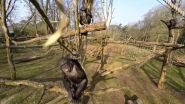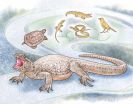Back to school and back to sleep
Poor sleep might explain how stress affects health in kids, Concordia research shows
2015-09-03
(Press-News.org) Montreal, September 3, 2015 -- Sleep matters for kids, especially when they are stressed. A new study led by researchers Jinshia Ly, Jennifer J. McGrath and Jean-Philippe Gouin from Concordia University's Centre for Clinical Research in Health and the PERFORM Centre shows that poor sleep might explain how stress impacts health in kids.
A good night's sleep
Getting a good night's sleep might buffer the impact of stress on kids' cortisol level, which is a hormone produced in the adrenal gland to regulate the body's cardiovascular, metabolic and immune systems. While short-term exposure to cortisol prepares the body for the "fight or flight" response, long-term exposure to cortisol can put people at risk for health problems, like heart diseases, weight gain and depression.
What does it mean to have a good night's sleep? Jinshia Ly, lead author and graduate student, explains that, "sleep researchers distinguish sleep duration, or how long one spends sleeping, from sleep quality, or how well one sleeps. Sleeping throughout the night without waking up, feeling rested in the morning, and absence of sleep problems, such as nightmares, apnea and snoring, are examples of a better quality sleep."
Examining young sleepers
For the study, which was published in Psychoneuroendocrinology, the research team recruited 220 kids aged 8 to 18 years old. The participants gave saliva samples from which their cortisol levels were measured.
The kids and their parents also answered questions about stress, sleep habits and bedtime routines. The researchers found that poorer sleep quality, regardless of how long kids spent sleeping, promoted the negative effects of stress on their cortisol levels.
Advice for parents
So what are the implications for parents, as the school year starts and stress likely increases for kids? Better sleep, combined with other healthy lifestyle behaviours, can reduce the negative consequences of stress on kids' cortisol levels. They should sleep 8 to 9 hours each night.
"But it's even more important that they get to bed early with regular sleep and wake times, avoid napping during the day and avoid using electronic devices before bedtime. It is also important that parents educate their kids at an early age about the importance of consistent and healthy sleep habits," says Ly.
This solid grounding can help kids make better choices when they gain greater autonomy in setting their bedtime routines as they get older.
INFORMATION:
Partners in research: This study was part of the larger, ongoing Healthy Heart Project directed by Jennifer J. McGrath, associate professor from the Department of Psychology at Concordia University. This study was made possible by the Canadian Institutes of Health Research Operating Grant awarded to Jennifer J. McGrath and the Fonds de recherche du Québec - Santé bourse de formation maîtrise awarded to Jinshia Ly.
Related links:
Department of Psychology http://www.concordia.ca/artsci/psychology.html
Canadian Institutes of Health Research http://www.cihr-irsc.gc.ca/e/193.html
Fonds de recherche du Québec - Santé http://www.frqs.gouv.qc.ca/
Jennifer J. McGrath http://www.concordia.ca/artsci/psychology/faculty.html?fpid=jennifer-mcgrath
Jean-Philippe Gouin http://www.concordia.ca/faculty/jeanphilippe-gouin.html
PERFROM Centre http://www.concordia.ca/research/perform.html
Concordia University's Centre for Clinical Research in Health http://www.concordia.ca/research/clinical-research-health.html
Media contact:
Cléa Desjardins
Senior advisor, media relations
University Communications Services
Concordia University
Phone: 514-848-2424, ext. 5068
Email: clea.desjardins@concordia.ca
Web: http://www.concordia.ca/now/media-relations
Twitter: @CleaDesjardins
ELSE PRESS RELEASES FROM THIS DATE:
2015-09-03
Cool. Calm. And oh, so calculated. That's how a chimpanzee living in the Royal Burgers' Zoo in the Netherlands set out to swat an aerial drone that was filming her group. In an article in the journal Primates published by Springer, Jan van Hooff and Bas Lukkenaar explain it as yet another example of chimpanzees' make-do attitude to using whatever is on hand as tools.
The incident happened earlier this year, on 10 April, when a Dutch television crew was filming at the zoo in Arnhem. The idea was to use a drone to film the chimpanzees in their compound from different close-up ...
2015-09-03
Amsterdam, September 3, 2015 - 3D imaging of a mummified kestrel that died due to forced overeating provides evidence that the ancient Egyptians bred birds of prey as offerings for the gods, according to a new study published in the Journal of Archaeological Science. The digital CT imaging revealed that the kestrel was force-fed its last meal - a mouse - suggesting it was kept in captivity.
This is the first evidence to point to mass breeding of raptors as offerings to gods. The researchers behind the study, from the American University in Cairo, Stellenbosch University ...
2015-09-03
Amsterdam, September 3, 2015 - Elsevier, a world-leading provider of scientific, technical and medical information products and services, has announced that its Reviewer Recognition platform has launched a new functionality which enables reviewers to list their entire review history, including their reviews for non-Elsevier journals, in one place online. It also allows them to share their Reviewer Page publically - increasing visibility and recognition of their work.
Through the Reviewer Recognition platform, Elsevier reviewers already have access to a personal review ...
2015-09-03
A 260-million-year-old fossil species found in South Africa's Karoo Basin continues to provide information into the murky origins of turtles whose evolution fascinates scientists.
The fossil of an extinct reptile, named Eunotosaurus africanus, is the earliest known branch of the turtle tree of life.
"Eunotosaurus is a critical link connecting modern turtles to their evolutionary past," says Dr Gaberiel Bever an Honorary Research Associate at Wits University's Evolutionary Studies Institute (ESI) and scientist at the New York Institute of Technology.
Previous studies ...
2015-09-03
UK fisheries survey logbooks from the 1930s to 1950s have been digitised for the first time, revealing how cod responded to changing temperatures in the last century.
Scientists at the Centre for Environment, Fisheries and Aquaculture Science (Cefas) and the University of Exeter found that at the time, the warm seas experienced around Norway benefitted the cod, similar to the conditions there today.
Most cod eaten by the UK comes from northern seas including the Barents Sea around Norway, because the stocks there at the moment are at record highs. Cod stocks were also ...
2015-09-03
Study examines trees in Leicester City
Pollution levels for pedestrians reduced by seven per cent in city environment
Highlights importance of trees in urban planning decisions
Trees in cities throughout the UK could be significantly improving the quality of the air we breathe by decreasing pollution levels for pedestrians, researchers from the University of Leicester have revealed.
The team from the University of Leicester's Department of Physics and Astronomy found that trees have a regionally beneficial impact by increasing turbulence and reducing ambient ...
2015-09-03
In the first study of its kind, new research from the University of New Hampshire shows that crop rotations, in isolation from other management factors, can increase the functions performed by soil microbial communities that benefit plant growth. The study was conducted by researchers with the New Hampshire Agricultural Experiment Station.
The study was conducted by Lisa Tiemann, former postdoctoral student, Stuart Grandy, who was Tiemann's postdoctoral advisor, and Marshall McDaniel, former postdoctoral student of Grandy, all of the UNH Department of Natural Resources ...
2015-09-03
Philadelphia, PA, September 3, 2015 - People diagnosed with schizophrenia critically rely upon treatment with antipsychotic medications to manage their symptoms and help them function at home and in the workplace.
But despite their benefits, antipsychotic medications might also have some negative effects on brain structure or function when taken for long periods of time.
In fact, "the role played by antipsychotic treatment on the pathophysiologic trajectory of brain abnormalities in schizophrenia is currently a matter of lively debate," explains Dr. Antonio Vita, Professor ...
2015-09-03
CAMBRIDGE, Mass.--Researchers at MIT have developed a family of materials that can emit light of precisely controlled colors -- even pure white light -- and whose output can be tuned to respond to a wide variety of external conditions. The materials could find a variety of uses in detecting chemical and biological compounds, or mechanical and thermal conditions.
The material, a metallic polymer gel made using rare-earth elements, is described in a paper in the Journal of the American Chemical Society by assistant professor of materials science and engineering Niels Holten-Andersen, ...
2015-09-03
A sophisticated imaging technique has allowed scientists to virtually peer inside a 10-million-year-old sea urchin, uncovering a treasure trove of hidden fossils.
The international team of researchers from the United Kingdom, Spain and Germany, including Dr Imran Rahman from the University of Bristol, studied the exceptional specimen with the aid of state-of-the-art X-ray computed tomography (CT).
Their results show that the sea urchin fossil was riddled with borings made by shelled invertebrates called bivalves.
These fossilized boring bivalves were preserved inside ...
LAST 30 PRESS RELEASES:
[Press-News.org] Back to school and back to sleep
Poor sleep might explain how stress affects health in kids, Concordia research shows



